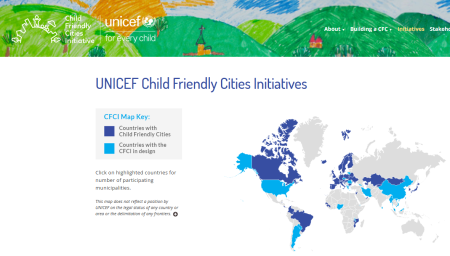As part of its work, UNICEF has launched a series of initiatives called Child-Friendly City. It is a network that brings together government and other stakeholders such as civil society organizations, the private sector, academia, the media and, more importantly, children themselves who want to make their cities and communities more child-friendly. The initiative was launched in 1996 by UNICEF and UN-Habitat to act on a resolution passed during the second United Nations Conference on Human Settlements (Habitat II) to make cities places suitable for all. The UN Conference declared that the well-being of children is the ultimate indicator of a healthy habitat, a democratic society and good governance.
A Child Friendly City (CFC) is a city, town, community, or any local community dedicated to improving the lives of children within its jurisdiction through the exercise of their rights as set forth in the UN Convention on the Rights of the Child.
In practice, it is a city, place or community in which the voices, needs, priorities and rights of children are an integral part of public policies, programs and decisions.
Generally speaking, it is a city, town or community in which:
- Children are protected from exploitation, violence and abuse.
- They have a good start in life to grow up healthy and cared for.
- They have access to quality social services.
- Experience quality, inclusive and participatory education and skills development.
- Children express their opinions and influence decisions that affect them.
- Children participate in family, cultural, urban and social life.
- They live in a safe, protected and clean environment with access to green areas.
- Meet friends and find places to play and enjoy.
- They have real chances in life regardless of ethnic origin, religion, income, gender or abilities.
All of us together, governments, other actors such as civil society organizations, the private sector, academia and the media, as well as the children themselves, have played an important role in exercising the rights of every child.
More materials and information about the initiative related to child-friendly cities can be found here.
- Accedi o registrati per poter commentare
- 229 viste






